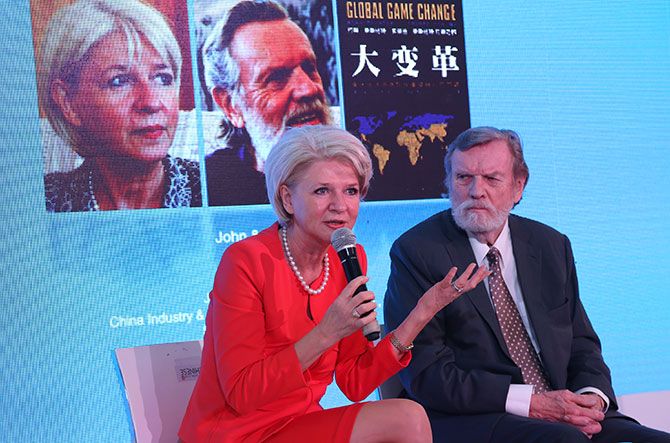'If a student can't get to school, the school will get to you. Even people with low reading abilities can be taught via videos.'
'Companies and students will be linked to their universities from the beginning and not towards the end of their course.'
'Digitalisation in education will be of enormous impact. Higher education must be closely linked to the demands on the future workforce.'

Best-selling authors Professors John and Doris Naisbitt were in New Delhi recently to promote their latest book, Global Game Change (Sage). It focuses on their belief that the Global Southern Belt, comprising 150 developing countries, will drive the global economy.
John Naisbitt's first book, Megatrends, published in 1982, sold a massive 14 million plus copies.
He has written several other bestsellers, including Re-inventing The Corporation and Global Paradox.
Doris Naisbitt writes a bi-weekly column in the China Youth Daily, China's second largest selling newspaper.
John and Doris Naisbitt shared their views about the evolving world economy, and India's place in it, with Rashme Sehgal.
Your book highlights how 150 nations are going to become the economic drivers of the future and how many of these nations belong to South Asia and Africa.
What kind of leadership role do you see these nations playing given that, at present, a large amount of technological innovation for these countries continues to come from the West?
If we talk about the 150 nations which we collectively call the Global Southern Belt, we have to be aware of two things.
One, the countries are at different stages and speeds of development and the time frame we talk about is for the next decade. In the beginning, we cannot expect them to take the lead.
As of now, China is clearly leading the parade, both economically and politically.
If we look at technology, the picture is mixed as well. There is a wide gap between announcing and achieving India's 'Technology Vision 2035'.
We are not questioning the potential of India's people, but, without providing a nourishing environment for scientists and entrepreneurs, this will not happen.
India's core problems need to be resolved, and resolved quickly.
China, which has been very ambitious about achieving its goal to become an innovation nation, has already taken the lead in the number of patent applications. While it may be a question of quantity rather than quality, they are advancing towards their goal with a great deal of strength.
How significant can India and China's roles be in this new scenario, especially since, while the Indian economy is doing well, its manufacturing sector has still to pick up?
Even though India and China are often put into one pot, we disagree with such a view.
China and India have different historical and cultural backgrounds. Each country will develop at its own speed. China created a set of extremely realistic manufacturing goals for themselves way back in 1978.
The technological achievements of both countries are different. Today, rising productivity is not necessarily linked to workforce and wages. Rather, to achieve these objectives, there is a need to leapfrog directly into digital production.
The challenge that India and China face is education. The future does not lie in cheap labour, but for the public to move into the field of tech jobs.
Your book highlights how the global middle class will double from two billion in 2012 to five billion by 2030. While this is undoubtedly a major leap forward, this group will aspire to a more affluent lifestyle similar to their Western counterparts.
There is a great deal to be optimistic about as far as this is concerned, but there are apprehensions about the enormous environmental pressures this will put on the planet, given that we are witnessing major climate change and both developed and developing nations are under pressure to rein in their greenhouse gases. What do you feel?
Environmental considerations are a challenge and an opportunity.
But the opportunities it holds for entrepreneurs can only be leveraged if the government creates the conditions needed.
There has been a change in the mindset in developing countries to move from high growth to sustainable growth, but that alone won't do it.
India too has very ambitious goals, but it needs realistic targets with step-by-step corrections and adaptations on the way.
People are confronted with polluted air, dirty rivers and piles of garbage and even the most ambitious government cannot hide this any more.
People have been disappointed too often by promises not delivered. It is time to deliver on these goals and for state governments to take the first small steps towards improvement.

Yes, we require high quality urban governance especially since an increasing middle class will see rapid urbanisation. This in turn will require high quality urban governance. Unfortunately, this is an area that the developing countries remain weak in.
With a 2.4 per cent growth each year, and with India having achieved slightly more than 32 per cent urbanisation, the process is rather slow. That might hold a chance for local governments to step up on the creation of infrastructure and transportation systems in order to keep up with the speed of urbanisation.
We have studied the rapid development in Chengdu (in Western China), a city that today hosts more than 250 of the Fortune 500 companies. The strategy was to create high tech clusters with a close connection between manufacturers and suppliers.
Another policy was to support four city centres instead of just one, which reduces the time spent on the daily commute to work.
The hurdle in Western democracies is that election cycles favour short-term promises. It is much harder to convince voters to choose long-term benefits over immediate benefits. That's true for local governments as well as national governments.
You talk about growth, but the question people in these countries are asking is how are these nations going to deal with shortages of power, water and other resources?
The answer to such shortages is directly linked to the previous question: How to 'sell' necessary temporary reduction to the population and yet survive politically.
Again, this has a lot to do with education.
In Western countries, as well as in developing countries, there is a lack of understanding that freedom comes with responsibility. The more democratic a country becomes, the more the responsibility of the people increases.
This is true for personal consumption as well as the choices we make when we elect our leaders.
In general, there is a growing awareness that nature cannot be exploited without facing serious consequences. That is a good ground to build on.
China today is leading in renewable energy and has become the world's largest investor in clean energy. We believe that its goal to increase wind and solar power capacity by more than 20 per cent in 2016 is within reach.
It is not only economically desirable, but also a political necessity in a country that draws justification for its governance by the results it achieves.
What kind of technological breakthroughs do you foresee taking place in these developing countries?
The key word is digitalisation.
Many African countries are aiming to leapfrog from the agricultural age to the digital age. Just think about African entrepreneurs who, while local infrastructure is very poor, have been enabled to do business globally via the Internet.
Access to the Internet will play a very important role in being able to achieve higher standards in all businesses, including agriculture.
What kind of technological breakthroughs do you foresee as also breakthroughs in the areas of public health, employment, social sector and education in the next two decades?
Digitalisation will play a catalytic role in these nations moving forward. There is, of course, some concern about jobs being lost. And it is true. We will lose (some) jobs, but we will gain others.
It is part of a healthy churning in a highly competitive environment.
Digitalisation in education, although still in its infancy, will be of enormous impact. Higher education must be closely linked to the demands on the future workforce.
Companies and students will be linked to their universities from the beginning and not towards the end of their course which, of course, will be a challenge to traditional structures.
There is potential in the fact that if a student cannot get to school, the school will get to you. Even people with low reading abilities can be taught via videos and increase their productivity, for example in the area of agriculture.
Health care is about to be revolutionised by software in clinical areas and in business models.
Modern technology is the enabler. The hurdle to implementation is not the available technological standards, but the fact that adaption and utilisation rates are lagging behind current standards.
Education, in many regards, will be the decisive factor. Patients, doctors and medical personnel must become familiar with new technologies for the whole sector.
How people-centric will this new global order be?
Just consider how individuals today are linked with each other. Messages, experiences, complaints and praise can be shared within minutes by millions. The growing voices of the people can no longer be ignored.
How are we going to combine greater public scrutiny, government regulation and customer satisfaction and integrate this with greater sustainability? Is this feasible?
In our book, we talk about the two big Es -- education and economics. In Western democracy, the people decide. The problem is that the majority is not always right.
To make decisions that do not only focus on short term benefits, but on sustainable progress, we need governments to be able to make strategic decisions without being punished immediately by dropping approval rates.
True leadership in politics has become rare while, globally, problems seem on the rise. The feasibility of good governing not only depends on reliable politicians, but also on how responsible people act.










 © 2025
© 2025